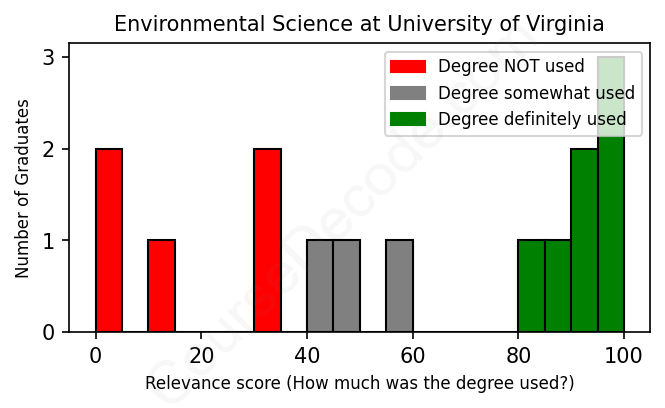
First, some facts. Of the Environmental Science graduates from University of Virginia we've analyzed , here's how many have used (or NOT used) their degree in their career:

These are estimates based on AI analysis of 15 LinkedIn profiles (see below).
The verdict? Below average. Overall, with an average relevance score of 57%, Environmental Science graduates from University of Virginia have a lower likelihood (-10%) of finding work in this field compared to the average graduate across all fields:
And for comparison, here's the chart for all profiles we've looked at across all degrees.
Also, after graduating, 60% of these graduates have pursued further education other than another Bachelor's degree (such as a Masters degree or other), compared to the average across all profiles of 35%. This suggests you may need more than just a Bachelors degree to be competitive as a Environmental Science graduate.
See the details:
|
Relevance score: 43% We think this person has gone into a career only somewhat relevant to their degree. We think this person has gone into a career only somewhat relevant to their degree.
DEGREE INFOGraduated in 2010 from University of Virginia with a Bachelor of Science in Environmental Science. No other secondary education since. JOB HISTORY SINCE GRADUATIONEnvironmental Project Manager Dominion Due Diligence Group Jul 2010 - Apr 2013 Project Manager  Nova Consulting Group, Inc. Oct 2013 - Dec 2014 Project Scientist  ERM: Environmental Resources Management Jan 2015 - Jan 2017 Taekwondo Instructor  TG Taekwondo Sep 2016 - Nov 2018 Taekwondo Instructor  Dynamic Afterschool Taekwondo of West End Feb 2019 - Present ABOUTTaekwondo Instructor and childcare worker in Richmond, VA. Former Taekwondo Instructor and Accounting Director with two years of experience in Albany, CA. Former Project Manager with six years of experience conducting Phase I Environmental Site Assessments to ASTM and client standards throughout the United States. |
The top 10 most common jobs done by the graduates we've analyzed (ranked most common to least) are:
When looking at the variety of jobs held by graduates from the Environmental Science program at the University of Virginia, it's clear there's a mix of relevant and unrelated positions. Many have landed roles that directly utilize their degree, like Environmental Scientists, Sustainability Coordinators, and Project Managers in environmental settings, which are fantastic fits for their educational background. However, it's also evident that a good number of these graduates have taken jobs that don’t relate at all to environmental science—such as drivers, salespeople, and medical scribes. These positions showcase how graduates sometimes veer off their expected career paths, either by choice or due to the job market's challenges.
Overall, while there are certainly plentiful opportunities in environmental science-related careers for these graduates, the job landscape is quite varied. Many have effectively translated their environmental science knowledge into roles that focus on conservation, research, and sustainability, which are highly relevant. Yet, there's a fair share working in fields that don’t require their specialized training, emphasizing the importance of being adaptable in today’s job market. So, while some graduates are making a direct impact in environmental fields, others are navigating different paths entirely, showcasing the diversity of backgrounds and interests among those who study environmental science.
Here is a visual representation of the most common words in job titles for Environmental Science graduates (this is across all Environmental Science graduates we've analyzed, not just those who went to University of Virginia):

Looking at the career paths of University of Virginia graduates in Environmental Science, it's pretty clear that they've taken a mix of routes after leaving school. It seems like many of the grads who graduated around 2010 or 2012 started out with respectable jobs related to their field, such as research positions or environmental project management roles. However, there are also quite a few who veered off into quite different territories or ended up in roles that aren't directly related to environmental science, like sales or teaching. For instance, some earlier grads found jobs as environmental project managers or research aides, which is great, but others drifted into roles like being a taekwondo instructor or a sales specialist, which makes you wonder if their degree was a key factor in their current jobs.
Fast forward to about five or ten years later, and while some grads still seem to be holding onto their environmental-related careers, others have completely shifted gears. For example, a few folks moved into roles in healthcare as physician assistants or better-paying management positions in unrelated fields. That trend suggests that while a degree in Environmental Science can definitely kickstart a career focused on sustainability and ecology, it doesn't lock graduates into that niche forever. In fact, it appears that adaptability plays a huge role in where people end up, with some using their education as a stepping stone into somewhat different sectors. Overall, there’s a mix of solid environmental careers and others that seem more like a detour, which is the reality for many graduates these days.
Getting a Bachelor’s degree in Environmental Science, whether at the University of Virginia or elsewhere, can be challenging but really rewarding. It usually involves a good mix of science, policy, and fieldwork, so you’ll be diving into biology, chemistry, and even some social sciences—all of which can be pretty demanding. UVA has a solid reputation, so you can expect rigorous courses and plenty of hands-on projects or labs that will keep you engaged. While some students find it manageable if they stay organized and passionate about the subject, others can find it tough, especially when juggling all the reading, research, and possibly field experiences. Overall, it’s not just about memorizing facts; you'll need to think critically and apply what you learn, which can be a bit of a grind, but many students find it super interesting and worthwhile!
Most commonly, in the LinkedIn profiles we've looked at, it takes people 4 years to finish a Bachelor degree in Environmental Science.
Looking at the job paths taken by these Environmental Science grads from UVA, it seems like they've carved out some pretty diverse careers, but the money game is a mixed bag. Some of the folks, especially those in higher-level positions like Assistant Research Professors or Senior Planners, likely have decent salaries, especially since they’ve moved into roles that sound like they come with good paychecks over time. On the flip side, others started with jobs that probably didn’t pay much, like driving for a transit service or working at a credit union. Overall, while a few seem to have landed well-paying jobs, there’s a chance that many of them just haven't hit those big bucks yet. So, it’s a bit of a grind with some success stories sprinkled in!
Here is a visual representation of the most common words seen in the "about" section of LinkedIn profiles who have a Bachelor degree in Environmental Science (this is across all Environmental Science graduates we've analyzed, not just those who went to University of Virginia). This may or may not be useful:

Here are all colleges offering a Bachelor degree in Environmental Science (ordered by the average relevance score of their Environmental Science graduates, best to worst) where we have analyzed at least 10 of their graduates:
| College | Score | Count |
|---|---|---|
 University of North Carolina at Chapel Hill University of North Carolina at Chapel Hill
|
87 | 10 |
 The Ohio State University The Ohio State University
|
85 | 12 |
 University of Vermont University of Vermont
|
68 | 13 |
 University of Oregon University of Oregon
|
66 | 10 |
 Western Washington University Western Washington University
|
63 | 14 |
 University of Virginia University of Virginia
|
57 | 15 |
 Oregon State University Oregon State University
|
56 | 11 |
 Loyola University Chicago Loyola University Chicago
|
56 | 11 |
 Southern New Hampshire University Southern New Hampshire University
|
53 | 15 |
 University of Phoenix University of Phoenix
|
46 | 15 |
 Florida State University Florida State University
|
45 | 16 |